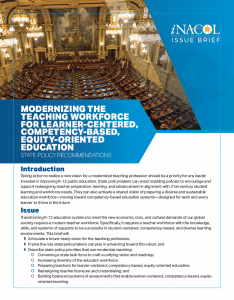iNACOL Releases State Policy Recommendations: Modernizing the Teaching Workforce for Learner-Centered, Competency-Based, Equity-Oriented Education
Education Domain Blog
 Today, iNACOL released Modernizing the Teaching Workforce for Learner-Centered, Competency-Based, Equity-Oriented Education: State Policy Recommendations. The policy brief recommends steps that state policymakers can take to advance a new vision for the teaching profession.
Today, iNACOL released Modernizing the Teaching Workforce for Learner-Centered, Competency-Based, Equity-Oriented Education: State Policy Recommendations. The policy brief recommends steps that state policymakers can take to advance a new vision for the teaching profession.
The issue brief builds on a paradigm shift that was first articulated in Moving Toward Mastery: Growing, Developing, and Sustaining Educators for Competency-Based Education. Published in October 2018, the original, ground-breaking report describes what it could look like to align teaching with the opportunities and demands of a 21st-century competency-based education system, re-imagining multiple aspects of the teaching profession from pre-service training through retirement. The report’s vision centers around three core concepts, transforming the profession to be equity-oriented, learning-centered, and lifelong.
The newly published issue brief identifies priorities for state policymakers with recommendations and actions:
- Convene a state task force to craft a unifying vision and roadmap. Although change must engage and empower local leaders, educators, and communities, it is helpful to have state-level support to initiate and coordinate change processes across diverse sets of institutions and stakeholders. State policymakers can play pivotal roles in convening, coordinating, and supporting planning and implementation efforts.
- Increase the diversity of the educator workforce. A teaching workforce that reflects the diversity and life experiences of today’s communities and schools is an important part of closing achievement and opportunity gaps and ensuring all students are prepared to succeed in postsecondary education and beyond. State policymakers can support diversity in the workforce by expanding access to teacher preparation programs. They should also prioritize diversity, equity, and inclusion (DEI) in the educator-leader workforce, which is strongly tied to staff retention, fosters cultures of transparency and accountability, and leads to better decision-making and results for students. State policymakers can influence a focus on DEI by communicating about it, prioritizing state funding for it, and identifying gaps in workforce data that impede progress toward a more diverse, equitable, and inclusive environment.
- Prepare teachers for learner-centered, competency-based, equity-oriented education. Creating a future-ready teaching workforce requires preparing teachers for learner-centered and competency-based education systems, which entails different knowledge, skills, and dispositions than teaching in traditional classrooms. State policymakers can help shift teacher preparation programs by enacting policies that incentivize and support innovation in higher education and by leveraging learnings from innovation pilots to shift future policy and practice.
- Redesign teacher licensure and credentialing. Teacher licensure and credentialing requirements influence what teacher preparation programs teach, how they are organized, how teachers engage in ongoing development, and how they advance and specialize in their careers. State leaders can help modernize the teacher workforce by aligning licensure and credentialing requirements to the educator knowledge and skills required for learner-centered education and by aligning licensure and credentialing processes to learner-centered approaches.
- Build balanced systems of assessments that enable learner-centered, competency-based, equity-oriented teaching. The Every Student Succeeds Act (ESSA) allows states significantly more flexibility to design systems of assessments that support students’ deeper learning and report on achievement outcomes. State policymakers can guide leaders across the state to design balanced systems of assessment that promote deeper learning and improved outcomes.
State policymakers play an important role in modernizing educator development systems by shaping preparation pathways, reimagining teacher licensure and credentialing, and enacting policies that create systems of assessments, learning, and supports that are fit for purpose. But, policymakers cannot go it alone. The most effective and sustainable state pathways to a future-ready teacher workforce are those that foster collaboration between policymakers, professional boards, state administrators, higher education, and K-12 leaders and approach changes related to the teaching profession as part of a coherent policymaking approach.
Download the full issue brief here and learn more from other resources below.
Learn More:
- Moving Toward Mastery: Growing, Developing, and Sustaining Educators for Competency-Based Education
- Developing a Modern Teacher Workforce: Federal Policy Recommendations for Professional Learning and Supporting Future-Focused, Competency-Based Education Systems
- iNACOL 2019 State Policy Priorities
- iNACOL 2019 Federal Policy Priorities